Field Report: Travel to Eritrea & Djibouti
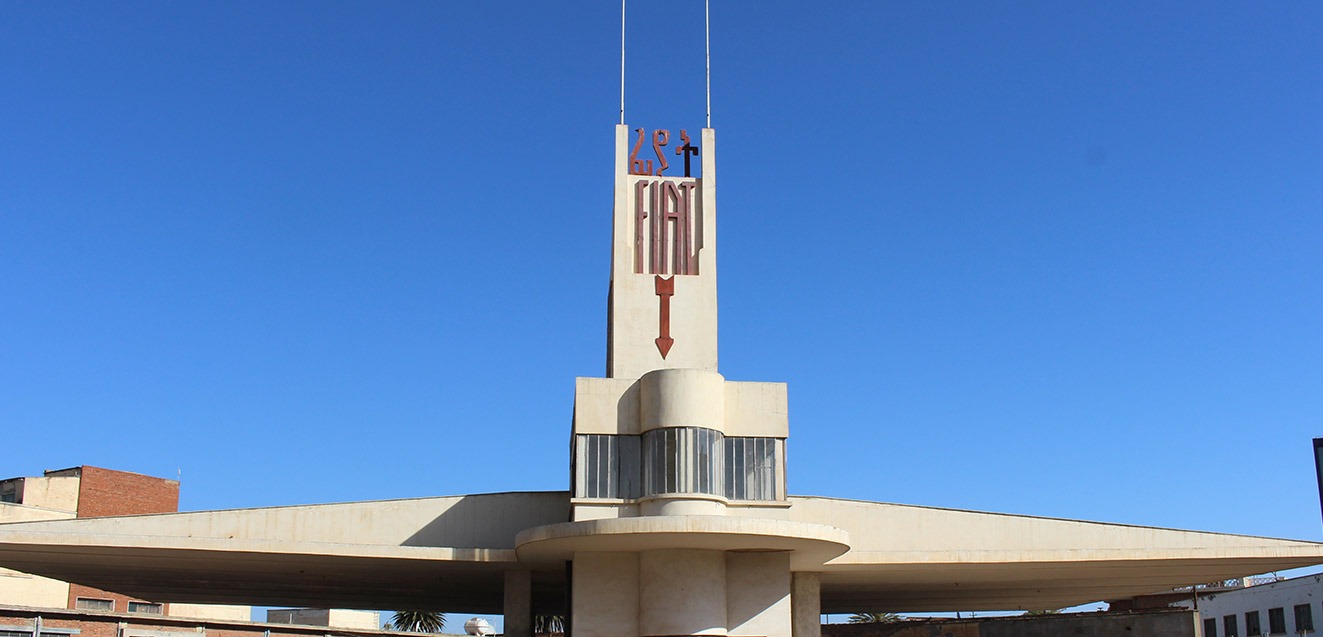
GeoEx COO Scott Montgomery loves to travel off the beaten track, both to satisfy his own wanderlust and to uncover fascinating new destinations for future GeoEx travelers. His journey to Eritrea and Djibouti in early 2020 was so exhilarating that it inspired GeoEx’s trip planners to craft a very special itinerary to these two destinations, plus neighboring Somaliland as well. GeoEx has just launched this trip, with four departures scheduled for 2022. We recently spoke with Scott about his adventures in and impressions of these two little-visited countries.
QUESTIONS ABOUT ERITREA
What initially made you want to go to Eritrea?
Eritrea has always been a place I have been curious about. I had been aware of the conflict between Ethiopia and Eritrea for many years, and learned a bit more about it, from the Ethiopian perspective, when I traveled through Ethiopia ten years ago. I had heard stories of the Italian Art Deco architecture, and a friend mentioned that he had the best lasagna of his life at a restaurant in Asmara. When Ethiopia and Eritrea finalized a peace agreement in 2018, I knew it was time to go.
In addition to the architecture and cuisine, were there any other specific aspects of the history and/or culture that were especially intriguing or appealing to you?
I remember reading Robert Kaplan’s Surrender or Starve when it was published back in 2008. I have always appreciated his writing, and this book gave me deeper insights into the situation in Eritrea, as well in other countries that make up the Horn of Africa. I was struck by the struggle of the Eritrean people, and as I read the book, my interest in visiting the country deepened.
How long was your trip, and where did you go?
We were in Eritrea only six days, and with such a short time, we were only able to explore Asmara and Keren.
What were your first impressions?
I was struck first of all by the complete absence of tourists.
How did this make you feel?
It was very exciting. I felt like I was being met more authentically by people. The folks I encountered didn’t have a “this is how I deal with a tourist” shtick down. So much of the world is overrun by tourists these days, it is rare to find a spot without buses full of visitors. Eritrea felt truly off the map, and for me, that made the experience very sweet. There was a constant sense of newness and discovery, since there weren’t “tourist things to do or see” or “tourist activities.”
What were the highlights of your journey?
There were many. One of the most memorable highlights was the Monday market in Keren, a huge and lively market where vendors were selling everything from underwear and shoes to camels and cattle. It was a bit dusty from the animals moving about, there was the smell of dung and smoke in the air, and the sounds were of men (only men in this area) negotiating in a language I could not understand, and of moos and snorts. It was an incredibly active scene, truly a hive of motion, as animals were purchased and taken away by their new owners.
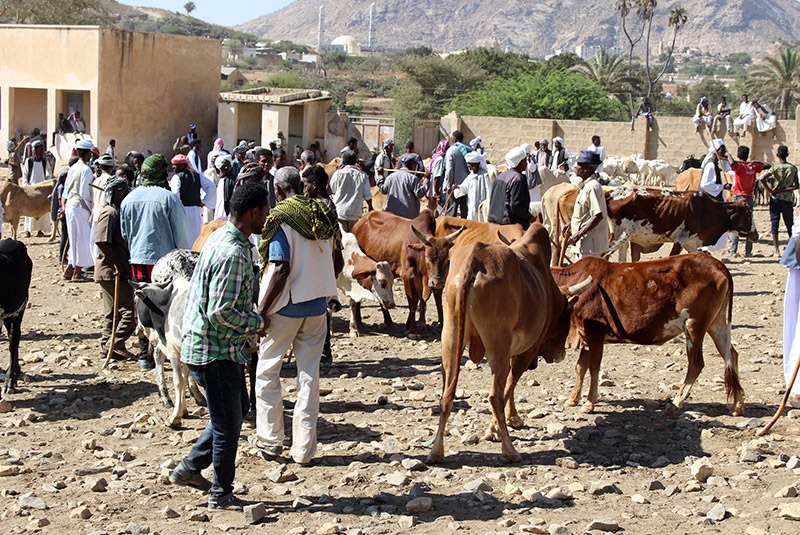
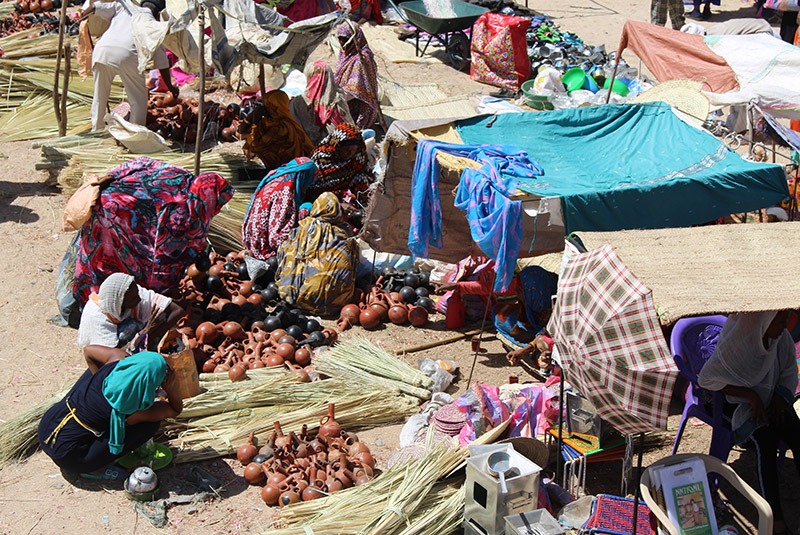
Were you tempted to buy anything?
I didn’t buy anything. The products were very basic, and I didn’t need a camel, cow, or goat.
Thank goodness! What were some other highlights?
Another highlight was the people, who were unfailingly kind and helpful. I especially recall one of the vendors at the Keren market. When he noticed me looking at some of his baskets, he very playfully started juggling them. He didn’t speak a word of English, and I had only learned how to say “thank you” in Tigrinya. Thank you is yekeniyeley and I had quite a time trying to pronounce that! The vendor was engaging and funny, and I felt absolutely no pressure to buy anything from him. We just shared a moment of fun. As we were preparing to leave, I said, “Yekeniyeley,” to bid him farewell. Even though I butchered the word, he smiled in delight.
The architecture in Asmara was a third highlight; the city is a treasure trove of Art Deco architecture. The Fiat Tagliero building was especially impressive. It was built as a Futurist-style service station in 1938; it looks like an airplane that just happens to be resting on a street. There were also an incredible old cinema building and a wonderful opera house, and many, many other striking buildings. One could spend a day just looking at the architecture in Asmara.
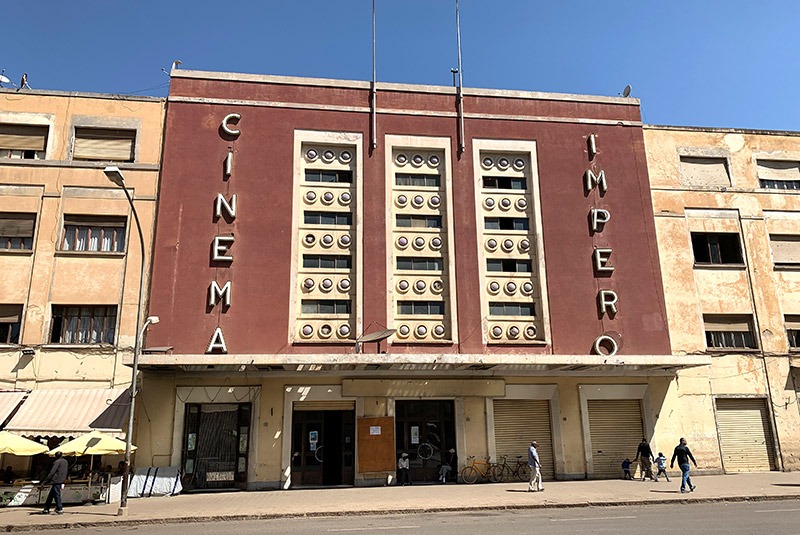
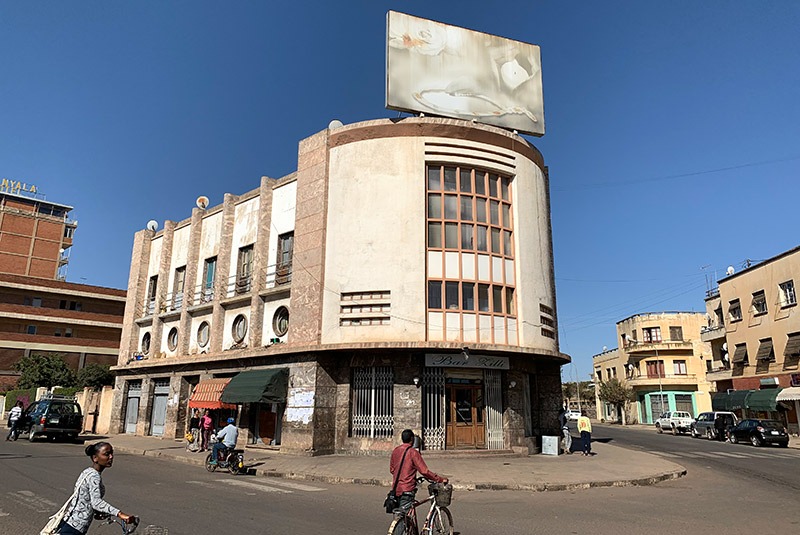
Finally, the lasagna was pretty darn good, and Asmara has a thriving coffee shop scene thanks to the Italian influence. The atmosphere at these cafes was a wonderful blend of both Italy and Africa. They served cappuccinos and lattes, the cuisine was Italian, and the staff and guests wore primarily jeans and T-shirts, but sitting outside it was clear from the buildings, roads, and sky that one was in Africa.
How were the travel conditions: roads, restaurants, hotels?
The roads were OK, not as bad as some I’ve encountered in other parts of the world. There were some nice restaurants in Asmara, but once we got outside the capital, there were few options. The hotels were pretty basic; particularly outside of Asmara, the accommodations were mostly one-star. Even the best hotel in Asmara would not necessarily be ranked as three-star.
But we were completely prepared for this. When I am going to be part of the “early explorers” group, I don’t expect much in the way of creature comforts. That seems like a very fair trade-off to me.
Did you have any especially memorable dining experiences?
Based on my friend’s experience, I was on the hunt for incredible lasagna. And one night at a lovely restaurant in Asmara, I did have a delicious lasagna. I am not sure it was the best I have ever tasted, but enjoying it while sitting outside on a delightful evening in Asmara made it pretty darn amazing.
What was your greatest surprise?
The lack of tourists. Even at the Monday market in Keren there were only a handful.
At the end of your journey, what was your feeling about Eritrea?
I felt grateful to have had a chance to visit, and some regret that I had not had more time. I felt fortunate to visit before large numbers of tourists arrive.
Is there anything else you would like to tell GeoEx travelers about the country and your journey there?
Go soon while there are still very few tourists.
QUESTIONS ABOUT DJIBOUTI
What initially made you want to go to Djibouti?
Djibouti was a place I had heard about from the days when there was a French Foreign Legion base located there. It had always seemed an interesting place of international intrigue. America, France, Japan, and China all have major military bases in the tiny country.
How long was your stay in Djibouti?
After our time in Eritrea, we had three nights in Djibouti.
What were your first impressions?
I found Djibouti much more developed than Eritrea. The port was very active, and Djibouti City, the capital of the country, was quite bustling, with larger buildings and much more traffic than Asmara.
What were the highlights of your journey in Djibouti?
Lake Assal was the biggest highlight. The huge lake is set in a deep crater valley. There is crystalized white sand that one is able to walk on extending hundreds of feet into the lake. That sand is almost pure white. The color of the water in the lake is a mix of green and blue, green as it touches the crystalized salt, and blue in the center of the lake. It is the lowest point in Africa, and it was amazing.
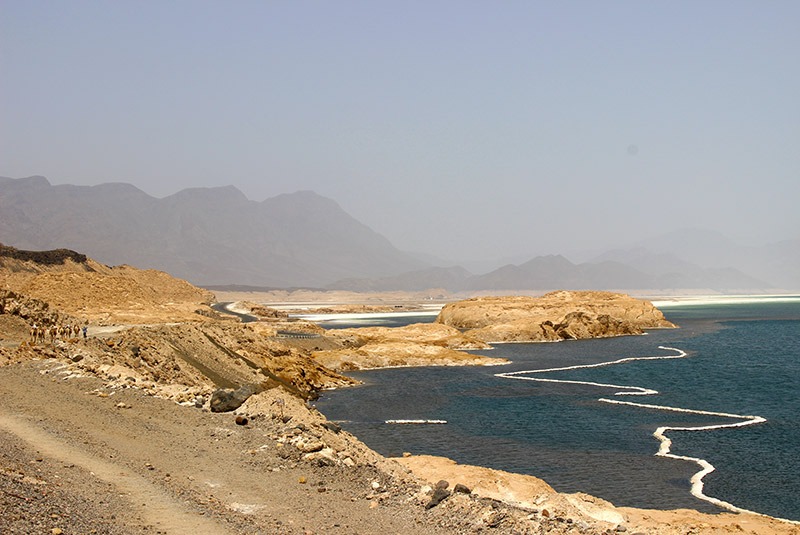
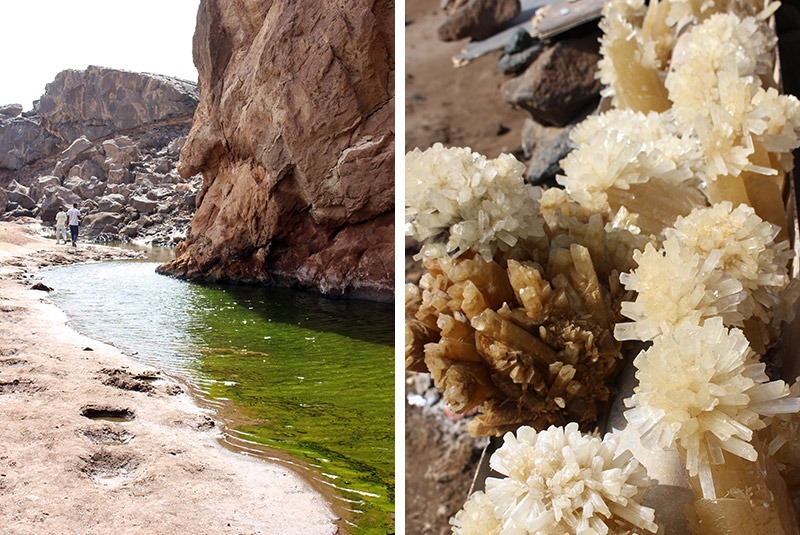
The drive from Djibouti City to the lake was also interesting. We drove through some spectacular canyon areas, and we often passed herds of camels.
How were the travel conditions: roads, restaurants, hotels?
A real step-up from Eritrea. The roads were good. In Djibouti City there were several good restaurants, and the Kempinski Hotel was a delight after some days of roughing it in Eritrea. The Kempinski is a grand hotel with a huge lobby and beautiful décor, and a spectacular location on the water. The staff were friendly and spoke English well. The modern air conditioning was a huge relief after the ancient AC units in Eritrea, and the hot water flowing on demand in the beautiful bathroom was heavenly.
Did you have any especially memorable dining experiences?
Djibouti, with its large expat community from countries around the world, offered a wide variety of cuisine options. We had an amazing seafood dinner one night in a restaurant right alongside the water. The chef invited us to pick from the catch of the day, and prepared the fish just as we liked. It was wonderful to be outside on the Gulf of Aden, on a warm starlit night, enjoying truly delicious fresh seafood.
What was your greatest surprise?
I was surprised by the number of soldiers, from multiple countries, that we saw. Djibouti is very strategically located right at the entrance to the Red Sea. It sits straight across the Gulf of Aden from Yemen. Due to this location, it has been heavily fought over historically. Now, Djibouti does very well on the revenue it takes in from hosting French, American, British, Japanese, and Chinese bases. Other EU nations, like Italy, have a military presence as well. This definitely gives the place an air of international intrigue. One can’t visit the bases, but even at the Kempinski, we saw soldiers from four or five nations.
Is there anything else you would like to tell GeoEx travelers about Djibouti and your journey there?
As I said about Eritrea, I would encourage people to go now to avoid the inevitable influx of tourists. As with Eritrea, we saw very few foreign travelers in Djibouti. I am envious that GeoEx travelers will have the opportunity to visit Somaliland as well!
* * * * *
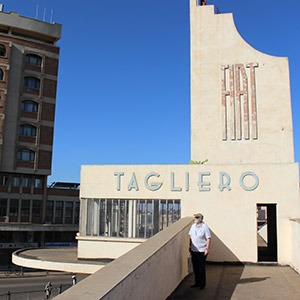
To find out more about our small group journey to Eritrea, Somaliland & Djibouti, call our travel experts at 888-570-7108.
* * * * *
Thank you for joining us on this conversational journey! If you have a question for Scott about his travels in the Horn of Africa, please share it in the comments section below. Thank you!
Enjoyed this field report! And why I signed up for the Eritrea, Somaliland & Djibouti tour next March. I did request, if possible, the inclusion of a traditional Eritrean music/dance performance. Looking forward!
Thank you Scott and Don for this interesting look into two unusual tourist destinations in Africa. I have just added them to my Bucket List! I’ll bet GeoEx has the best guides for these places as well as the best itineraries!

